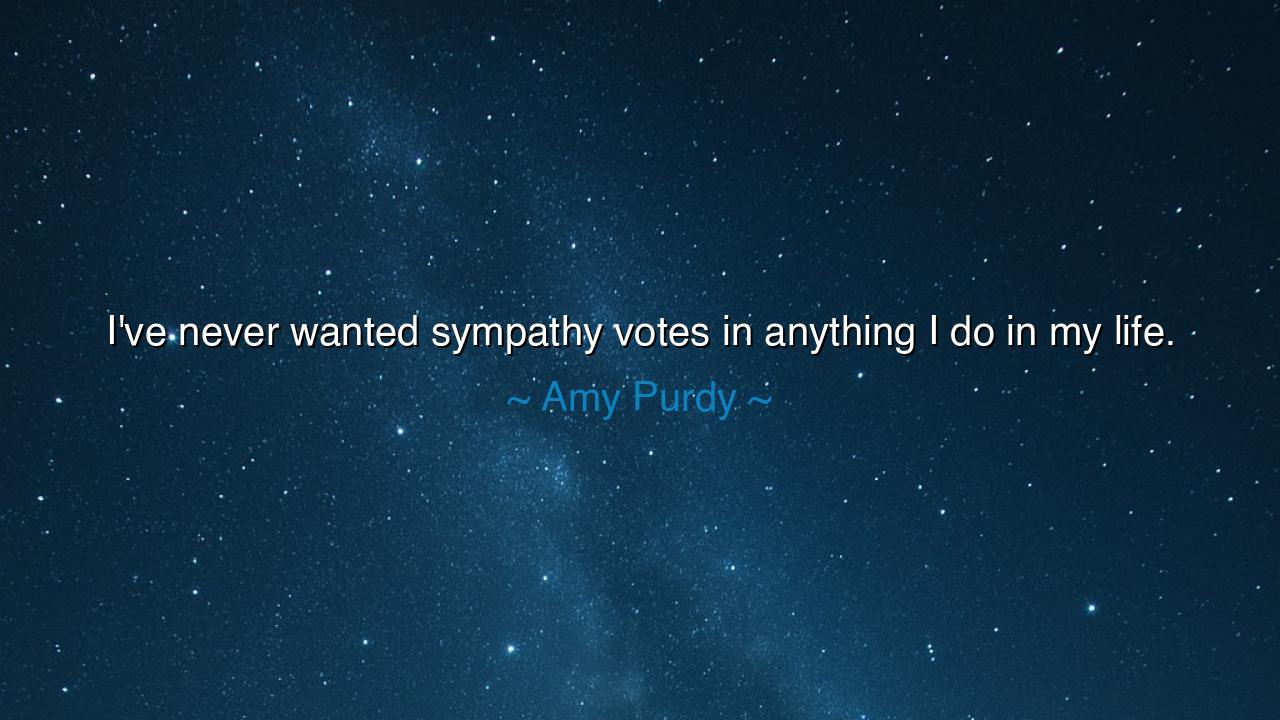
I've never wanted sympathy votes in anything I do in my life.






Hear, O children of courage and endurance, the words of Amy Purdy, who declared: “I’ve never wanted sympathy votes in anything I do in my life.” These words, though simple, resound like the cry of a warrior who has faced suffering yet refused to be defined by it. They are the song of one who has endured great trial—losing her legs to illness—yet chose not to be pitied, but to rise, to excel, and to be measured not by charity but by merit, not by sympathy but by strength.
The meaning is thus: to seek sympathy votes is to allow others to reward weakness instead of greatness. It is to ask that pity, not excellence, be the standard of judgment. Purdy, in rejecting this, declares that her worth is not to be diminished by the gaze of pity, but exalted by the labor of her will. She does not wish to be praised because she suffered, but because she conquered. This is a creed not only for her, but for all who wish to live in dignity, refusing the false comfort of lowered expectations.
The ancients, too, spoke of such virtue. Consider the tale of Spartacus, born into slavery, yet he did not beg for sympathy from his masters. Instead, he broke his chains and fought for freedom. His greatness lay not in the pity of Rome, but in the strength of his resolve. So too does Purdy stand: not as one who asks to be excused, but as one who demands to be measured by the same flame that tempers all champions.
History also offers the story of Franklin D. Roosevelt, who was stricken by polio and confined to a wheelchair. Yet he never sought leadership through sympathy. He did not want the people’s pity, but their trust in his vision. By strength of will, he guided a nation through depression and war. His disability was real, but he refused to let it become the reason for power. Like Purdy, he understood that true greatness is not granted by compassion, but earned by the unyielding pursuit of purpose.
At the heart of Purdy’s words is the spirit of self-reliance and dignity. Sympathy, though noble when shared in sorrow, can also become a cage, trapping the afflicted in the eyes of others as weak or lesser. To reject sympathy votes is to demand equality of challenge, to say: “Test me not by the softness of your heart, but by the strength of my deeds.” Such resolve is rare, but it is the essence of true empowerment.
The lesson for us is clear: do not seek pity as the measure of your worth. If life has placed burdens upon your shoulders, carry them with courage, and let your victories shine brighter because of them. Do not beg for indulgence or ask that others lower the bar; instead, rise to it. In this way, you transform trial into triumph, and you inspire not by being pitied, but by being respected.
What, then, should you do in your own life? When hardship strikes, resist the temptation to lean upon the crutch of sympathy. Accept kindness, yes, but do not let it define you. Demand to be seen for your skills, your effort, your character. In your work, strive for excellence, not indulgence. In your relationships, cultivate respect, not pity. And in your own heart, tell yourself daily that your worth lies not in others’ sorrow for you, but in your own courage to rise.
Thus let Amy Purdy’s words endure: “I’ve never wanted sympathy votes in anything I do in my life.” For in them lies the battle cry of the strong soul, who turns suffering into strength and pity into pride. And if you too live by this creed, your life shall not be a monument to weakness, but a testament to the unyielding flame that no hardship can extinguish.






AAdministratorAdministrator
Welcome, honored guests. Please leave a comment, we will respond soon